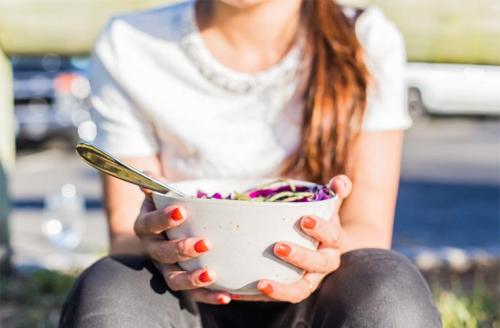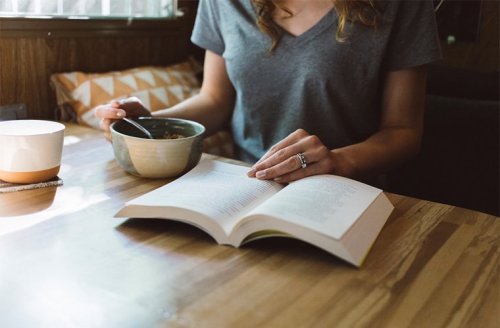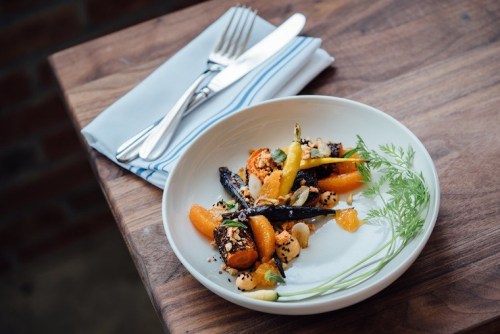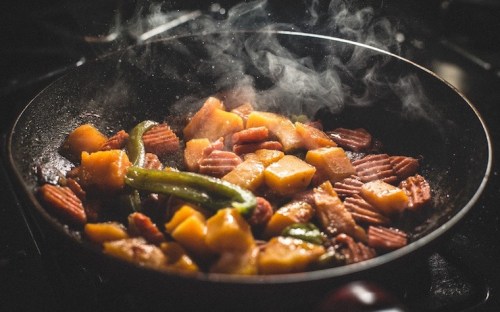9 Ayurvedic secrets to great digestion
The world's oldest healing science holds the secrets to better digestion. And guess what? Most of us aren't practicing them.

Sure, you make good-for-you smoothies in your NutriBullet, frequent Hu Kitchen and The Butcher’s Daughter, and generally go for natural desserts over fake ones, but you’ve still got digestive drama.
And that, according to Larissa Hall Carlson, an expert in Ayurveda—the five-thousand-year-old Indian medicinal practice—is because what you put in your body is only half the story.
“In Ayurveda, the mindfulness of eating is more important than what we eat,” she says. “Changing the way people approach food really affects gas, bloating, and indigestion.”
As a teacher at the Kripalu School of Ayurveda, Carlson spends her days opening her students’ eyes to the principle that how you eat matters. Here Carlson tears a page of out of her Kripalu text book and schools us in the nine helpful Ayurvedic tips for great digestion.
Scroll down for nine Ayurvedic secrets to great digestion.

1. Eat only when you’re hungry.
The problem with eating when you’re not hungry (aside from possible weight gain) is that it leaves you feeling bloated and uncomfortable. “Only when your stomach is truly empty are your digestive enzymes strong enough to thoroughly break down your food,” Carlson explains.
“Really try and differentiate between eating out of necessity and eating out of habit, and take three to four hours between meals (the time it takes to fully absorb your food),” says Carlson. “It’ll make a huge difference in how you feel overall.”

2. Eat in a calm, seated environment—at a moderate pace.
Many of us are lucky if we can suck down a green juice while racing to catch the subway to work or yoga. But taking just a few minutes more has huge digestive benefits. “When we actually sit down to eat, we can focus on the amount of food we are putting into our bellies and on chewing it thoroughly,” Carlson says. As for walking and eating? “Almost impossible,” she says. “People will only chew a couple of bites before swallowing, which causes the belly to do more work than the teeth.”

3. Really take in the smells, tastes, and textures of your meal.
Paying attention to the sensory details of your food matters! If you’re not actively smelling and appreciating the food you’re eating, your body won’t either, Carlson says. When you take time to soak in the smells, textures, and tastes, your stomach feels fuller after a meal, and you’ll spend the rest of the day a whole lot more satisfied.

4. Eat freshly-cooked foods.
If your food isn’t fresh, you won’t feel so fresh after eating it, according to Ayurveda. That’s because it’s lost its prana (“life force” in Sanskrit), which can leave you feeling tired and sluggish, Carlson says. So skip the heat-and-serve frozen stuff—she’s not a big fan of leftovers either—and spend a few extra minutes whipping up something new instead.

5. Sip warm water throughout the day, and at meals.
When you’re hydrated, it’s easier for food to pass through the digestive system (not to mention that you’ll feel fuller, faster). But pass on the ice, Carlson says. “Cold water is actually pretty challenging to digest,” she explains. “It takes the body about 30 minutes to digest warm water, and one hour to digest cold.” That’s because the body has to work overtime to heat up colder water before it can absorb it. (Bloating expert and nutritionist Stephanie Middleberg agrees.)

6. After meals, give yourself a few minutes to relax, breathe, or take a gentle walk.
Many of us pop our dishes in the sink and are out the door before we’ve finished our last bite. But shifting gears so quickly hinders the body’s ability to absorb food, halting blood flow in the stomach and decreasing circulation, Carlson says. “You don’t go swimming right after you eat, so don’t race around or dive back into work the second you’re done either,” she says.

7. Eat your biggest meal at lunch.
There’s an Ayurvedic principle “when the sun is at its highest point of the day, the digestive fire is strongest,” says Carlson. “We are a reflection of what’s happening in nature.” So do like the Europeans and eat your biggest meal at lunch, giving your body plenty of time to fully digest before going to bed, which is when the digestive system effectively shuts down.

8. Drink ginger tea.
It’s good for banishing bloating, and ginger tea is also amazing after a heavier meal, Carlson says, because it “helps to burn through the sluggishness and headiness caused by rich food.” Just don’t drink too much, as ginger can be a “little too fiery” for anyone with acid indigestion, she says. Try slowly sipping a weakly brewed version right after you eat.

9. Unplug while you eat.
Between the backlog of TV shows on your DVR and checking Instagram (guilty!), it’s hard for any of us to disconnect during mealtime. But not only do screens keep us from really paying attention to what we’re eating, they also engage the nervous system, which can cause physical digestion to shut down, Carlson says.
Looking for more ways to be more mindful? Try these techniques that will help you shine, even on bad days. And these meditation-minded wearables could help too.
Sign Up for Our Daily Newsletter
Get all the latest in wellness, trends, food, fitness, beauty, and more delivered right to your inbox.
Got it, you've been added to our email list.










